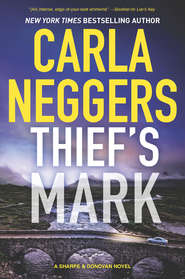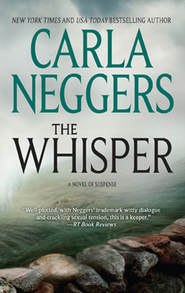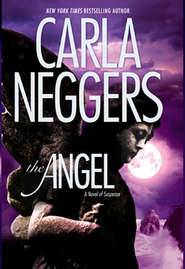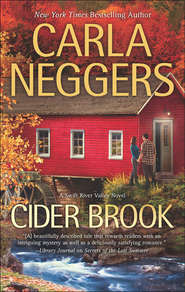По всем вопросам обращайтесь на: info@litportal.ru
(©) 2003-2025.
✖
Secrets of the Lost Summer
Автор
Год написания книги
2019
Настройки чтения
Размер шрифта
Высота строк
Поля
“Not much. She’s in her nineties.” Loretta stepped onto the porch, her back to him as she took in the view of the Pacific. Finally she turned to him. “Her father bought the house in 1938, after the state forced everyone out of their hometown to make way for the Quabbin Reservoir.”
That had to be the lake Dylan had seen on the map.
“Quabbin,” Loretta continued, still clearly amused, “is a Native American word that means ‘place of many waters,’ or ‘meeting of the waters.’ It refers to the Swift River Valley, which was laced with three branches of the Swift River and multiple streams—the perfect location for a reservoir.”
“Loretta,” Dylan said.
She waved a perfectly manicured hand at him. “Miss Webster’s ancestors settled in the valley in the mid-1700s. Two hundred years later, she and her family were forcibly bought out, along with everyone else in four towns, so the state could dam the valley and let it fill up with fresh water for metropolitan Boston. It’s one of the most egregious examples of eminent domain in U.S. history. I’d love to fight that case now.”
Dylan had no doubt, but he was lost. “How did you find all this out?”
“Internet. Our Grace is quoted in an interview with some of the last living residents of the valley before it was flooded. She’s a retired high school English and Latin teacher. She never married.”
Dylan considered his predicament, and the note from Olivia Frost. He couldn’t even guess why his father had bought the house, or why there was a cast-off refrigerator in the yard.
He joined his attorney and friend on the porch. A vibrant sunset filled up the sky and glowed on the Pacific across the street. “What do I do?” he asked.
“It’s your property,” Loretta said, gazing out at the sunset. “You can do whatever you want. Sell it, renovate it, give it away. Move in.”
“Move in? Why would I move in?”
“I don’t know. You could take up chopping wood and picking blackberries.” She crossed her arms in front of her in the chilly wind. “Those are blackberry vines in the picture of the old refrigerator, aren’t they?”
“I have no idea what they are.”
“Blackberry vines have thorns.”
Other vines had to have thorns, too, but Dylan really didn’t know or care. “What did my father pay for this place?”
“A pittance. He wrote a check. The house is a wreck but it sits on seven acres. Knights Bridge is out-of-the-way, in part because of the reservoir. It’s not like the area grew up naturally around a big lake. Quabbin didn’t exist when the towns were settled. Look on the map. You’ll see what I mean.”
He had, and he did.
“What’s the name of this farm again?” Loretta asked.
“The Farm at Carriage Hill.”
“Quaint. And the owner?”
“Olivia Frost.” Dylan ignored the cool wind as he watched joggers on the beach. “Why did my father buy a house in Knights Bridge, Loretta?”
“That,” she said, dropping her arms to her sides, “is your mystery to solve. If I were you, I’d let sleeping dogs lie and hire someone to clean up the yard, then quietly sell the place or give it away.”
“You’ll check out this Olivia Frost?”
“First thing when I get home. Right now, I’m going for a walk on the beach and enjoy the last of the sunset.” She headed to the steps but stopped before descending, again looking back at Dylan. “You’re not worried about this woman taking legal action, are you?”
“Not really, no.”
“Good. An old refrigerator and whatnot in the yard aren’t a serious concern.”
“I think I saw a washing machine, too.”
Dylan could hear Loretta laughing all the way down the steps and across the street to the water. He went back inside, shutting the door firmly behind him. The sunset was fading fast. He sat on his couch and picked up the note card from where he’d left it and the half-dozen photographs on the coffee table. Loretta hadn’t asked to inspect them. No point, he supposed. He eyed the chives, or whatever the hell they were. They looked hand-drawn. The design, the use of color and the handwriting were contemporary and stylish, not old-fashioned, yet they also conveyed warmth, hospitality and rural charm. He wasn’t quite sure how his Massachusetts neighbor had pulled off the effect but it worked.
He didn’t care how she’d pulled it off, either. Olivia Frost had written to him to ask—or demand—he move junk and a rusted appliance off property he hadn’t, until today, even suspected he owned.
He scooped up the photographs and took them and the card upstairs with him to his bedroom, the drapes still pulled from last night. He hadn’t bothered opening them since he had left for his office before light, but it wouldn’t have mattered. He wasn’t spending a lot of time in his bedroom these days. A few hours for sleep, time to get dressed—that was it. He hadn’t had a woman in his life in a long time. Too long, maybe, but he wasn’t checking off days on a calendar.
Not yet, anyway.
He set the card and photographs on the end of his bed, then sat on the floor and rubbed his fingers over the black-painted hinges and latch of an old flat-topped trunk. A nomad at heart, his father had left behind few possessions. On his fiftieth birthday, he had quit his day job as a business consultant and spent the rest of his life—more than twenty years—as an adventurer and treasure hunter, tackling obscure mysteries on his own and with a small team of professionals and avid amateurs. He had never sought financial gain for himself. Prowling the world for lost treasures had been his passion more than a source of income. He’d just enjoyed the adventure.
In the months since his father’s death, Dylan hadn’t dug through the contents of the trunk. He and his father had had a contentious yet solid relationship, but first the NHL and then NAK, Inc., kept Dylan’s schedule jam-packed, allowing little time to try to understand why Duncan McCaffrey had made the choices he had, or to figure out what treasure hunts he had left unfinished. Dylan didn’t need the money. Money was one thing he had in abundance, and how could anything in the trunk bring him closer to his father now that he was gone?
Dylan couldn’t imagine how long it would take him to properly sort through all the files, boxes, envelopes and scrapbooks stuffed haphazardly in the trunk. Hours and hours, and even if he had the time, he didn’t have the patience.
And there was no guarantee he would find one word about Knights Bridge.
He could send Loretta to Massachusetts to deal with the house and its offending yard, and with Olivia Frost.
He lifted out a tattered stack of a half-dozen manila folders, held together with a thick rubber band. He shook his head. “Leave it to you, Pop, to complicate my life.”
The rubber band was so dry and brittle it broke when Dylan tried to remove it.
He welcomed the distraction when his landline rang. He rolled to his feet and picked up.
“Check your email,” Loretta said. “I sent you some preliminary info on the woman who wrote to you.”
“Are she and Grace Webster friends?”
“Maybe, but Olivia Frost isn’t old. I can tell you that much.”
Loretta was chuckling when she hung up.
Dylan checked his email on his BlackBerry. Loretta had produced a photograph of his tidy-minded neighbor. It was taken at a formal dinner in Boston and showed Olivia Frost accepting an award. Apparently the owner of The Farm at Carriage Hill and artist of chives was also a successful, accomplished graphic designer.
The picture was too small to see in any detail on his BlackBerry. He went back downstairs and fired up his laptop on the kitchen table.
Olivia Frost had long, shining, very dark hair, porcelain skin and a bright smile as she held her gold statue and accepted her award. He couldn’t make out the color of her eyes. Green, maybe. She wore a sleek, rather businesslike black dress that came to just above her knees.
In another picture that Loretta had found on Facebook, Olivia was more casual, dressed in a denim jacket as she stood in front of an old sawmill. Loretta’s email explained that the Frost family owned and operated Frost Millworks, a small, profitable company that did high-end custom work.
She provided a link. Olivia Frost had designed their website.
Dylan called Loretta back. Before he even had a chance to say hello, she broke in, “I can keep digging if you want.”
“I’ll take it from here. Thanks, Loretta. What’s on the internet about me?”











